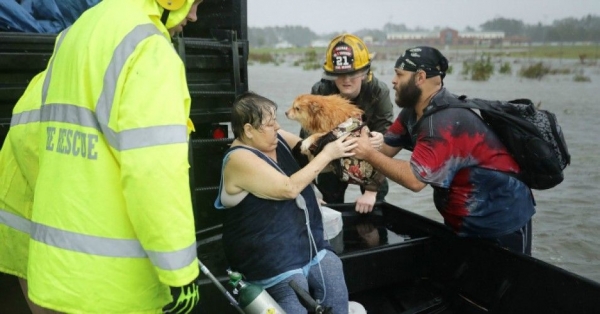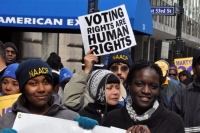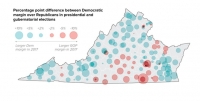As Hurricane Florence officially made landfall Friday, and forecasters warn of "life-threatening, catastrophic flash flooding," some attention has turned to residents across mandatory evacuation zones in the Carolinas and Virginia who chose to stay or were unable to leave, and how the poorest often pay the highest price when faced with a natural disaster.
Responding to a New York Times report in which an Edenton, North Carolina man who cares for his father—a cancer patient with whom he shares a double-wide trailer—explained that his family doesn't have the resources to leave, author and activist Naomi Klein tweeted Friday, "These disasters drag into the light exactly who is already being thrown away."
"Poverty lies in the path of Hurricane Florence in eastern N.C.," the Asheville Citizen Timesdeclared Thursday. "Some people are getting out of town, but that's not an option for me. I have no money, no job, no connections," Tony Clower, a 39-year-old homeless man living in Kinston, told the newspaper. "I want to cry. All I can do is put my hands together and ask God to keep me safe."
A Vox article outlining common reasons people don't always abide by evacuations orders noted that "there are people who don't leave due to disabilities—they simply can't get out of their homes and don't have anyone to help them." Some don't want to leave behind their pets, and can't find a shelter or hotel that will allow animals.
Others may underestimate the threat or not receive timely storm updates—though Vox pointed out, "in an age when warnings can be blasted out via radio, TV, and smartphones, and through old-fashioned door-to-door notifications, this is becoming less likely." And then there are those who fear their home will be looted, or those like Clower, who cannot afford to travel and stay somewhere safe.
Kathy Sexton, a 56-year-old resident of Myrtle Beach, South Carolina, spoke with the Washington Post about the various reasons she is trying to ride out the storm in her two-story townhouse:
[She] had thought about staying with relatives who live six hours away, but the long drive would be detrimental to her elderly mother, whose damaged spine keeps her from being able to sit for extended periods. She would've booked a hotel further inland, she said, but she couldn't afford the cost. She would've stayed at one of the emergency shelters, but pets aren't allowed there, she said. Sexton has two 15-year-old cats that both need medication, and she said there's no place to board them. Even if there was one, she doesn't trust anyone else to take care of them. "They're like family. There's just no way," she said.
Emergency rescues already have begun for those who wouldn't or couldn't evacuate, after coastal communities were struck by the outer bands of the storm on Thursday. In New Bern, North Carolina, as of 2:27am local time, about 150 residents were still waiting on assistance from FEMA crews, according to the city's Twitter account.
"People surrounding me are under water. They have been trapped in their attics," New Bern resident Tonya Moore told NBC News while awaiting rescue with her mother, husband, and five children. "Every road is flooded. There's nowhere to get out over here."
As Florence continued its crawl along the Southeast, FEMA on Friday cut off vouchers for 987 American families living in hotel rooms across the country after being displaced from their homes in Puerto Rico because of Hurricane Maria, which ravaged the U.S. territory last September. FEMA offered them one-way tickets back to the island—which is still struggling with widely ridiculed recovery efforts—but that offer also expires Friday.
Some of these families spoke with NBC News about their difficulties finding longer-term housing they can afford. Vimarie Cardona is a single mother of three who has lived in an Orlando hotel with her children since November. Now working as a housekeeper at Disney World, Cardona explained that landlords have refused to rent her one-bedroom apartments because of the size of her family, and two-bedroom options are outside of her price range.
"I started looking for apartments. Even before they said [the voucher payments] would end I started looking," she said Wednesday. "From day one it was hell."
Florence also comes just days after the conclusion of a multi-week nationwide prison strike to demand improved living conditions and an end to "modern day slavery" that was organized in response to an April riot at Lee Correctional Institution in South Carolina, where guards waited several hours intervene in violence that killed seven priosners and injured more than dozen.
As the hurricane approached this week, multiple other South Carolina detention facilities made headlines for refusing to evacuate inmates despite being located in a mandatory evacuation zones. Spokesmen insisted to VICE and BuzzFeed News that the facilities can safely withstand the storm.
However, as VICE outlined, there is a long history of inmates facing dangerous conditions after officials decline to evacuate due to a hurricane—or prisoners being abandoned altogether:
Inmates left behind at a federal prison near Houston following Hurricane Harvey in August 2017 reported food shortages, no drinking water, and sewage flooding. Many inmates weathered the storm still locked in their cells. And as Puerto Rico reeled in the devastated aftermath of Hurricane Maria, the U.S. Bureau of Prisons began evacuating inmates from its easternmost facility in Rio Grande due to sustained power outages. During the chaos of the relocation process after the hurricane, 13 inmates escaped.
City officials also reportedly abandoned inmates at the New Orleans Parish Prison during Hurricane Katrina in 2005. Human Rights Watch reported that correctional officers left more than 600 inmates in one building without supervision to weather the storm. Some inmates say they were left locked in their cells for days as flood water seeped into the jail, eventually reaching chest level, before they were evacuated.
Ahead of the storm on Wednesday, a group of prison reform activists gathered outside of the South Carolina statehouse to protest against the decision to keep inmates in facilities located within evacuation zones, pointing to post-Katrina conditions as well as prisoners who have died even when there isn't a hurricane forcing so many others to flee.
"In perfect conditions we see people dying," activist Stephanie Serna told The State, a local newspaper. "What makes us think that in an emergency situation they'll do better without any accountability?"
Link to original article from Common Dreams


 Imagine going to the polls on Election Day and discovering that your ballot could be collected and reviewed by the
Imagine going to the polls on Election Day and discovering that your ballot could be collected and reviewed by the ACLU Blueprints Offer Vision to Cut US Incarceration Rate in Half by Prioritizing 'People Over Prisons'
ACLU Blueprints Offer Vision to Cut US Incarceration Rate in Half by Prioritizing 'People Over Prisons'  "These disasters drag into the light exactly who is already being thrown away," notes Naomi Klein
"These disasters drag into the light exactly who is already being thrown away," notes Naomi Klein  How about some good news? Kansas Democratic Representative advances bill for Native Peoples.
How about some good news? Kansas Democratic Representative advances bill for Native Peoples.  What mattered was that he showed up — that he put himself in front of the people whose opinions on
What mattered was that he showed up — that he put himself in front of the people whose opinions on On a night of Democratic victories, one of the most significant wins came in Virginia, where the party held onto
On a night of Democratic victories, one of the most significant wins came in Virginia, where the party held onto A seismic political battle that could send shockwaves all the way to the White House was launched last week in
A seismic political battle that could send shockwaves all the way to the White House was launched last week in In an interview with Reuters conducted a month after he took office, Donald Trump asserted that the U.S. had “fallen
In an interview with Reuters conducted a month after he took office, Donald Trump asserted that the U.S. had “fallen Attorney General Jeff Sessions overturned the sweeping criminal charging policy of former attorney general Eric H. Holder Jr. and directed
Attorney General Jeff Sessions overturned the sweeping criminal charging policy of former attorney general Eric H. Holder Jr. and directed